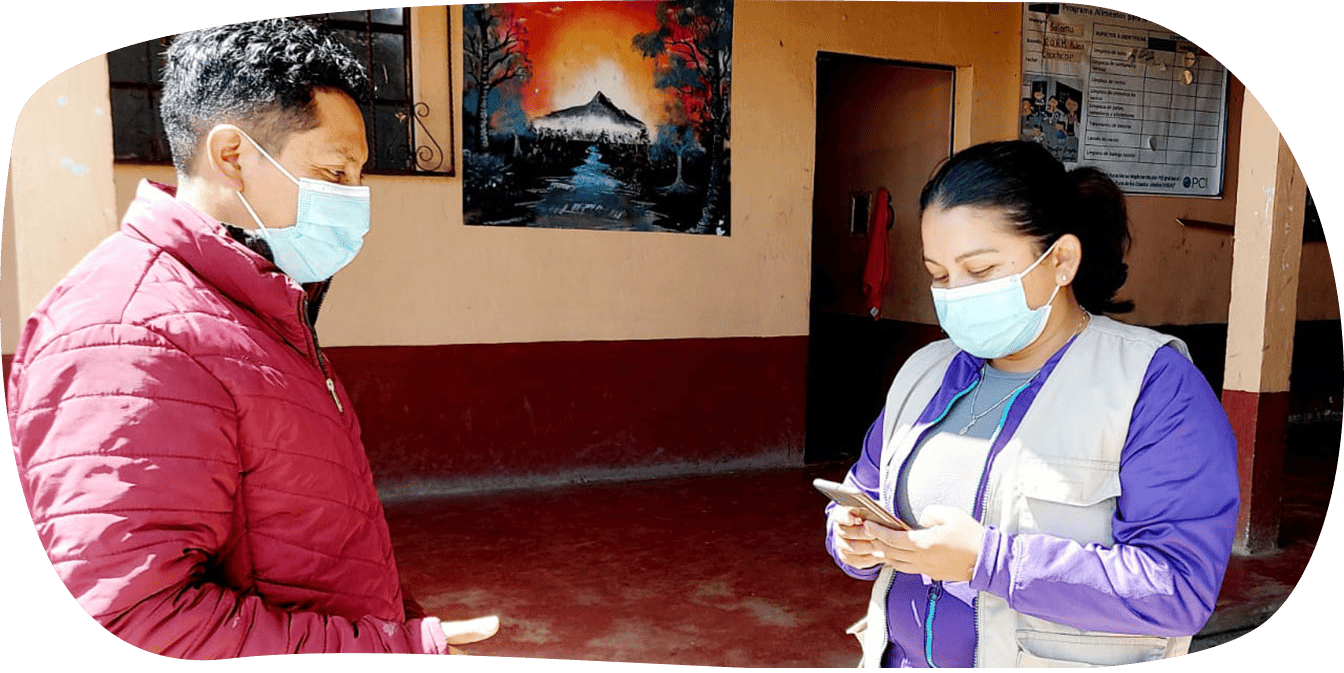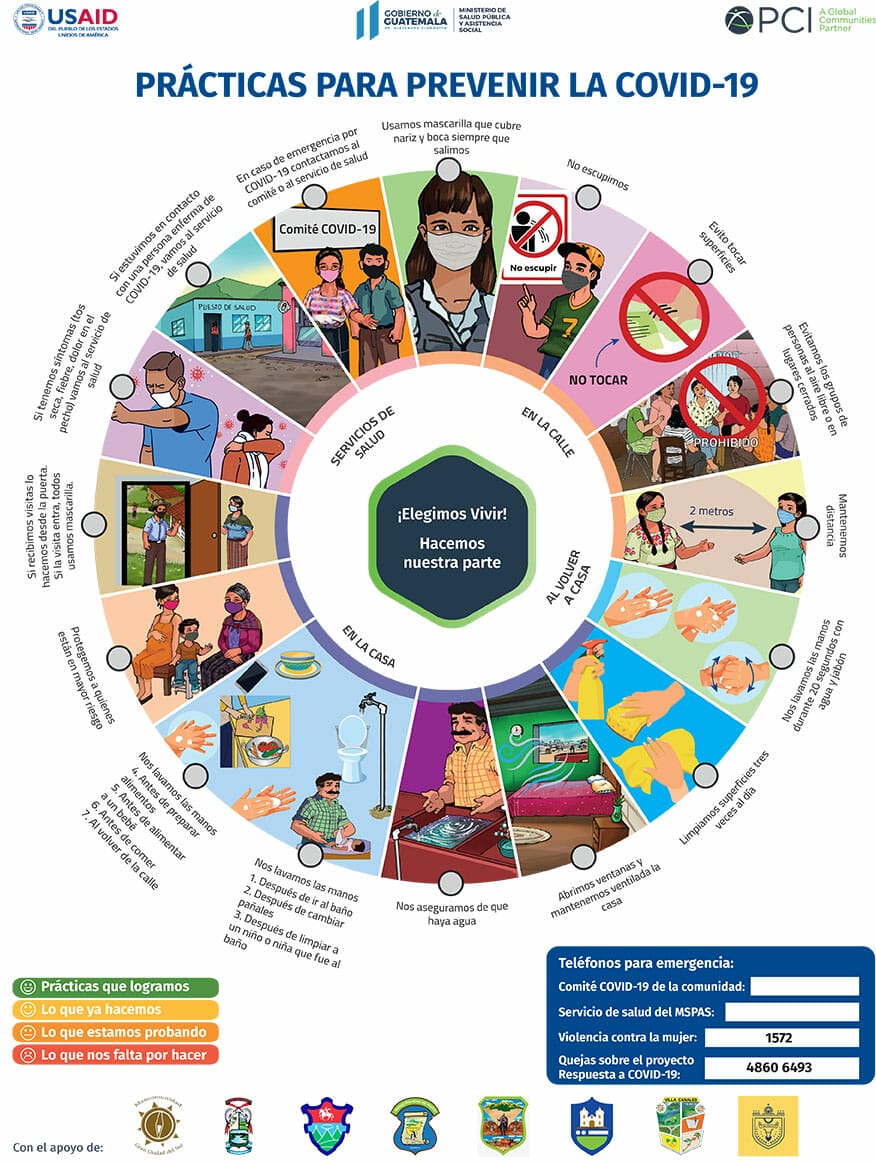HARDSHIP
Controlling the Spread of COVID-19 Misinformation in Guatemala

When COVID-19 began its relentless sweep across the globe, public health professionals, international development professionals and front-line responders quickly found themselves simultaneously fighting another crisis as disruptive as the disease itself.
Although social media and other digital platforms have given people opportunities to safely connect while quarantining or under lockdown, the constant flow of messaging about the coronavirus has led to an "infodemic," or dangerous rise in misinformation that could have serious consequences. Rumors and myths spreading online promote harmful practices that can increase the spread of the coronavirus, stigmatize certain populations, interrupt health services and undermine trust between communities and institutions.
In Guatemala, PCI, a Global Communities Partner, worked to stop the spread of misinformation about COVID-19 and steer people toward reliable information and prevention practices. The Guatemala team worked closely with a broad range of stakeholders - from the Pan-American Health Organization (PAHO) and Ministry of Health, to universities, municipalities and local organizations - on risk communication and community engagement. Efforts focused on both high-risk urban areas where COVID-19 caseloads were highest as well as underserved communities in the rural highlands of Huehuetenango.
"From the beginning of the COVID-19 Response Project, rumor tracking was identified as a key action to better understand the context and adjust the messages to be disseminated linked to the risk communication strategy," said Guillermo Hegel Algara, project manager of PCI/Guatemala's COVID-19 response. "Our methodology and messages have been evidence-based and allowed us to create a reliable channel of information about COVID-19 for the population, achieving the interest of the Ministry of Health and other organizations to improve and refine their communication campaigns."
Unfortunately, we do not have an expiration date for this pandemic.
Alma Ulario
Community member who serves on local COVID-19 prevention committee
At the project outset, PCI/Guatemala pursued membership in the National Presidential Commission for COVID-19 to ensure uninterrupted access to relevant data and resources needed for prioritizing communities and making informed decisions. Together with local partners, PCI/Guatemala developed a shared work plan to educate critical groups on COVID-19 preventive actions that take into consideration living conditions, transportation means and livelihoods. This included working through community influencers, decision makers, trusted leaders and existing community platforms such as churches, businesses, youth groups, savings groups, and community development and emergency response commissions to help the public distinguish between rumors and facts about the pandemic.
In order to take an evidenced-based approach to collecting and addressing rumors and misinformation about the COVID-19 outbreak, PCI created a Rumor Tracking System and dashboard. The system captured falsehoods circulated among individuals, households and communities as well as those identified by health service staff, community interest groups and municipal staff trained by PCI/Guatemala.
Through bi-weekly analysis meetings, a team of specialists analyzed the rumors, prioritized them and generated messages and strategies to counter the fake news. A group of 77 anti-rumor agents disseminated facts to communities and households through text messages, social media, word of mouth and community interventions. This approach built on the understanding that communities have the power and the agency to stop the spread of COVID-19. Community members can and do modify norms, beliefs and behaviors in response to shocks and stresses, and their collective local actions are at the heart of an effective COVID-19 response.
"The development of anti-rumor messages, anchored in truthful, timely and sufficient information is important to stop the spread of rumors and to flatten the contagion curve," said Roberto Samayoa, communications officer for PCI/Guatemala's COVID-19 Response Project.

PCI/Guatemala designed a COVID-19 awareness tool to educate community members on COVID-19 symptoms, when to go to the hospital and how to social distance, among other topics and recommended actions. Illustrations on the wheel were designed from a gender equity perspective and with respect for cultural identity.
One harmful rumor that spread in many countries was whether the COVID-19 vaccine is effective. To address this in Guatemala, PCI used its risk communication and rumor-tracking technical experience to prepare communities for the COVID-19 vaccine, assess their willingness to be vaccinated and support the Ministry of Health (MoH) with a vaccination communications plan. PCI was invited to participate in and strengthen the Vaccination Communication Commission from the Vaccination Against COVID-19 National Coordination Committee branch of the Guatemalan MoH with the support of PAHO, the U.S. Agency for International Development and other cooperation agencies from the health cluster.
The COVID-19 Response Project harnessed a mix of traditional and electronic outreach tools to promote COVID-19 prevention practices, including home visits, information kiosks, posters, promotional videos, radio broadcasts and text messaging campaigns. One awareness tool that was particularly effective in educating community members on how to stop and reduce the spread of the disease was a COVID-19 wheel that project staff placed in public locations and distributed to families during home visits.
0
anti-rumor agents were trained by PCI/Guatemala to fight online misinformation about COVID-19.
PCI/Guatemala designed the wheel to share information on COVID-19 symptoms, when to go to the hospital and how to social distance, among other topics and recommended actions. Illustrations on the wheel were designed from a gender equity perspective and with respect for cultural identity. The tool also provides contact information for the local COVID-19 prevention committee, nearest health service and to report violence against women.
"The project that PCI brought here to Barrio San Antonio in Mixco helped many people," said Alma Ulario, a community member who serves on her local COVID-19 prevention committee. "Unfortunately, we do not have an expiration date for this pandemic. While it lasts, we have to continue supporting our neighbors to be alert and remember all the things to avoid, so as not to get infected at this time."
Story by Maureen Simpson

